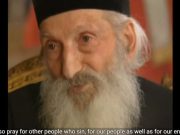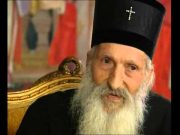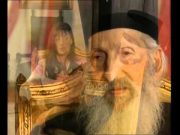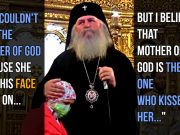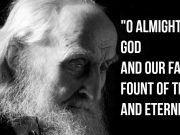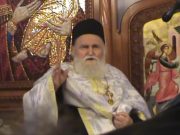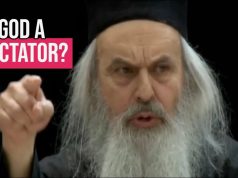In this audio, Metropolitan Athanasios of Limassol shares real stories of people whose faith and daily lives were transformed by receiving Holy Communion.
English translation: Vasileia. Watch the full video on their channel: https://www.youtube.com/watch?v=W2lLHTGkyNY
Met. Athanasios:
I have met people in my life who were unable to live without the Holy Communion one day. Not even one day. And sometimes they would have to cover long distances so as to find a place to receive the Holy Communion. And the first Christians would go to receive the Holy Communion in the night, at midnight, and they didn’t have brightly lit avenues back then like we do here now, and it’s easy to walk at night. In those days it was pitch dark at night. And they would go to the cemeteries or in the catacombs to perform the Holy Liturgy and the Holy Eucharist and commune of Christ’s body and blood. And they would get arrested sometimes by Roman soldiers who would kill them in the end. We have lots of cases of Christians who were killed in groups all together because they were gathered for the Holy Eucharist. They either burned them alive, like it happened in Nikomedia (today Izmit), where they burned the 20,000 martyrs, or in other cases they killed Christians in groups, they threw them to the lions, etc.
We have a multitude of martyrs and the reason was because they would gather, mainly on Sundays, to perform the Holy Eucharist and receive the Body and Blood of Christ. This was the most important thing for the Christians. It was inconceivable for a Christian not to be present at the Holy Liturgy and not receive the Holy Communion. It was inconceivable to be present at the Holy liturgy and not receive the Holy communion. He would have to explain the reason why he wouldn’t receive the Holy Communion. If a Christian was present at the Holy Liturgy and abstained from the Holy Communion, he would have to explain why he didn’t receive the Holy Communion. Only a heretic cannot receive the Holy Communion and also a person of another faith. Only these two groups aren’t allowed to receive the Holy Communion. Otherwise people had to give an explanation.
Even the ones who couldn’t receive the Holy Communion were not allowed to stand in the Church together with the others, but they would stand in the entrance porch (narthex). They would attend the Holy Liturgy from the narthex because they couldn’t commune. These were people who, although they were Orthodox Christians, couldn’t commune for certain spiritual reasons. Because of a spiritual reason they had to prepare themselves before they were allowed to commune. So, since they weren’t allowed to commune, they weren’t allowed to be in the Church either. They were present but they stayed at the narthex.
This is why, if you go to a pre-sanctified Holy Liturgy, you’ll hear something we hear every Sunday too: “let all catechumens depart.” They could attend the Holy Liturgy up to the Gospel reading. They read some specific prayers for them and then they had to leave. They were not allowed to stay in the Holy Liturgy because they couldn’t receive the Holy Communion. So after the Gospel reading the Christians said some prayers for the catechumen and then they would leave. Then, all the ones who were about to get baptized approached and people prayed for them too and they, too, had to leave. This is why we say: “depart; you who are preparing for illumination.” And they were present at the Holy Liturgy after their Baptism for the first time. So, after their Baptism they would stay for the Holy Liturgy and they would receive the Holy Communion.
This is why at Christmas or at Easter, on Holy Saturday, we chant: “As many as have been baptized into Christ, have put on Christ” during the Holy Liturgy instead of the Trisagion, because on that day the catechumen were baptized and they were present at the Holy Liturgy. So the Holy Eucharist is the climax of our practical life in Christ. And this has been noticed by all those who wished and still wish to live a life in Christ.
And I’ll say it again, my dear children, that we should be very careful not to be deceived or have this wrong impression: The fact that we may have the impression that we can live a true Christian life or that we can love Christ or that we can have a relationship with God, without the Holy Communion, without partaking of the Holy Eucharist. This can’t be done, my dear children. Christ was clear and definite. Christ clearly stated in our Evangelion that: “Very truly I tell you, unless you eat the flesh of the Son of Man and drink his blood, you have no life in you” (John 6:53). This means that you are dead. When Christ stated that so clearly, and this scandalized the Jews—they said: “What is this man talking about? Eat his body and drink his blood? What is this all about?” And they left. Even the Apostles were scandalized for a moment at these words. They said: “This is a hard teaching. Who can accept it? Eat His body and drink His blood?” Everything else was Ok but “drink my blood?” This was inconceivable, especially for a Jew. Yet, Christ didn’t change His words. Instead He said: “If you want to leave, too, you are free to go.” Of course Christ didn’t literally mean they should drink His blood, but what He truly meant was this mystery of the Holy Eucharist, which He delivered to His disciples at the dinner table on Holy Thursday, when Christ told His disciples: “Take. Eat. This is my body.” This IS my body. And not as some heretics say that “it symbolizes Christ’s body.” We, as Greeks know, or we should know what the verb esti means (=is in old Greek). So it’s another thing if I say “it is” and another if I say “it symbolizes my body.” It’s not a symbol, it’s not something that reminds us of the body of Christ, but it’s truly the Body of Christ, and it’s truly the Blood of Christ. “This is my blood” (Christ said).
So, this is the only way we can truly experience the presence of Christ. And it’s a great blessing that when many people receive the Holy Communion, they are very conscious and they have a strong desire and longing for the Holy Communion, and they truly become the abodes of Christ, they are united with Christ. A lot of times I’ve talked to you about our contemporary saints who often received the Holy Communion, filled with a burning flame of love for Christ. So much love, such burning flame of love, that the kind of love you young people feel for each other, the couples who are in love, is zero compared to this spiritual status, and not the physical, carnal kind of love. The spiritual status of divine love (the saints have) for Christ and the feeling of the immense love of Christ for his people. I told you that this was an overwhelming event for our Elder Joseph.
We performed a Holy Liturgy every day through all our monastic life in our skete. The Fathers received the Holy Communion 4 times a week, on Tuesdays, on Thursdays, on Saturdays and on Sundays. Our Elder received the Holy Communion just like all of us did. For many years I was the only priest of our brotherhood because all Fathers were younger than me and I supposedly was old in my monastic age. There were older fathers in physical age but I was the oldest in monastic life. And I was a priest (all others were monks). So I would offer Communion to my Elder too, who was a simple monk. All these years, countless times, he would receive the Holy Communion from me.
How can I describe this? Never in his life, not even once, literally not once did he ever receive the Holy Communion without shedding tears. I don’t mean one drop, like we do sometimes—we do have tears for other reasons I’m sure!—I’m talking about tears, wailing. Lots of times, as he approached to commune—and we are not talking about a baby or a little girl who gets easily emotional—but he was a grown up man, an old man, and he was a hard man, a hard-working person, he could turn a stone into dust with his fist—a hard-working man. A tough man. Yet, before the Holy Communion he would melt down. Lots of times, as he was about to commune, I would have to wait for a while for him to be able to control his wailing, to stop wailing for a while and be able to swallow the Holy Communion. What can I say? He was soaked in tears. And I would say to myself: “But can’t he come to the Holy Communion just like we all do for once?” Instead we go as if it’s something insignificant, sometimes elbowing one another. We ask for God’s forgiveness but we remain dry like a stone. What can we do when we are like stones? Maybe stones have some hope too. We have some hope too. God will help us too in any way He can. Stones are necessary too, sometimes!
But was there a special button he pressed and all these tears showed up? What kind of button was this? This button was his self-reproach. He cultivated self-reproach. What is self-reproach? It’s humbleness. It’s humbleness and repentance. He was reproaching himself. And truly he spent his whole life in tears. Not tears that break you apart, not tears that kill you, but these were tears of joy. He was all-joyous. He was full of joy, and when he died, a smile came to his face at once. What did Christ say? He said: “Blessed are the ones who mourn for they will be comforted.” He was crying all his life and when he died he smiled. Whereas we spend all our life laughing and we cry when we die! We giggle all day, especially the ones from Limassol. We giggle and giggle but when death is near we cry, we don’t want to die. Instead he would cry and cry and when death came he smiled.
Once I called him on his nameday to wish him. I said: “Many years, Geronta.” He said: “No, child, for Christ’s sake, don’t curse me this way, and being a Bishop, as you are, your curses might come true!” “But I didn’t curse you, I said many years….” “Please, no, no, I don’t want to live many years, but we’d better leave and go to our Father, our Heavenly Father.” He was looking forward to exiting this world. When I went close to him I was 18 and he was my age now, about 55, 57. I often heard stories about Elder Joseph (of Vatopedi) so I wanted to meet him. He was one of the most well-known Elders on Mount Athos. So, I went there and I stayed so as to meet him. He said: “What can I say child, I’m near the end of my life.” I wondered: “How old can he be?” I was only 18 and I couldn’t understand how old he could be. I said to myself: “He must be really old.” He said: “I’m sitting here looking at my grave right here.” I said: “Holy Mother of God!” I turned to look and he pointed saying: “This is where my grave is, child…I see it open right now.” I could see no grave there.
I tried to tell him something about the invasion of Cyprus, this was in 1976. He said: “What Cyprus are you telling me now child? I’m leaving… My days in this world are coming to an end. I’m getting ready for my grave… my days are over.” But I wanted to stay with him and I said to myself: “How can I stay with such an old man? He may die any moment now!” Every now and then he kept saying the same, that he was going to die the next day, then the next day again, etc. Until one day Elder Paisos said to him: “Geronta, don’t say that you are going to die, because you scare the children.” And we said to ourselves: “But what if he dies and we are left alone? What could we do?” We were still young boys in monasticism. How would we end up? And on his desk there were some verses about death written from the Scriptures! And he would often say: “Do you think I’ll live to this Easter? No way!” We asked him for example: “Geronta, what shall we cook for Easter?” “What Easter child? I’m not going to be here at Easter!”
Lord have mercy! All day he would say: “Get ready.” He had prepared the candles for his funeral, his burial clothes too, and he showed us the place he wanted to be buried. He went there and made the designs, and he said: “This is where you’ll bury me and these are my burial clothes and the candles etc.” He even told us what to cook on the day of his funeral and everything else in detail. In the end all of us nearly died but our Elder was still alive! He died 2 or 3 years ago! This was 30 years after I met him and all these years he was expecting he would die the next day, always! The next day he would die and then the next day, the next morning he would die, etc. And, sometimes, when we knocked on his door without receiving any answer back we would wonder: “Do you think he’s dead?” There was a nun called Eugenia and he would often say to her: “Dear Eugenia, I’m going to die now.” “Ok, Geronta, why don’t you die then and get it over with at last?” “You’ve been saying this every day for years now!” If you are to die, go ahead, die, and let’s get it over with!
So, in this way, they lived their own lives. They lived in a different atmosphere. Truly the Holy Communion was something unprecedented to them. And there was another father, Arsenios, who I met when I was a student in Thessaloniki, and we lived close to each other when I was in my first year at University. He was a professor in the School of Agriculture, even though he was monk, but he was a holy person, and he was practising the incessant prayer as a spiritual work. He would pray incessantly, and he would receive the Holy Communion every day. And he would take me too every day—I was a child back then in the city of Thessaloniki—and he knew where there was a Holy Liturgy every day, and we would go and receive the Holy Communion every day. This is what changed my whole life. It was inconceivable to him to let one day go by without the Holy Communion. Such a strong desire did people have to commune of Christ’s Body and Blood! And today we are so weak in faith that even if we are pushed by others we’ll refuse to go. We are unfortunately sluggish and lukewarm and we abstain from the Holy Communion.
So, as we are approaching the Holy Week, my dear children, and the Resurrection of the Lord, let’s try at least to go one step further. Let’s try to prepare ourselves through humbleness, repentance and Confession this Lent. And do not miss the great services of the Church. Don’t make the mistake and miss the services. Attend all services of the Holy Week. If you can’t attend the morning services, those of you who work, go to the evening services with your books and pay attention to the Troparia, which unfold all the mystery of Christ before our eyes. And just this thing, meaning, just experiencing the Holy Week through the hymns, is an inconceivable spiritual event which one’s soul can experience. And the culmination of all this is to approach the right way, with repentance, approach the Holy Communion with a contrition of heart to commune of the body and blood of Christ. This is what “a Christian” means to us. Everything else is just theory. The ultimate experience of our Christian life is our participation in the Holy Eucharist. Pay attention to my words and you’ll find out that this is what it’s all about and this is the reason we do everything that we do. Not so as to become “good children” but so as to be united with Christ here in this life and eternally of course, by defeating decay, sin and death.
If you have any questions, we have some more minutes. Antony? The girl next to him…. “Hello….” “Father, I have two questions, if you allow me….” “Ask me one at a time otherwise I’ll forget….” “My first question….When I was abroad in different countries, what impressed me, with the exception of Greece, was the unbelievable strictness of priests, which made me realize what a great mystery this was, which I never realized when I was in Cyprus so many years. And when I was in Germany I couldn’t find a Greek Orthodox Church nearby, and so I went to a Romanian Church, and I was waiting in the line for the Holy Communion and when my turn came the priest asked: ‘Are you Orthodox?'” I said: “Yes. I’m from Cyprus.” He asked: “Do you have a spiritual father?” I said: “Yes, I often confess.” He asked: “When was the last time you confessed?” I said: “A month ago, when I was in Cyprus.” He said: “I’m sorry but I can’t offer you Communion because I don’t know if you truly confessed. And one month is a long time…” In Cyprus I never saw such strictness. Also when I went to a Serbian Church, I saw that you have to confess right there before the Communion. Why aren’t things the same in Cyprus or in Greece?
“Look, I think we don’t need any of these two extremes. Neither should we go to Communion without the right preparation, meaning, the right repentance and confession, nor should we go to the other extreme the Slavs practise, meaning that you have to confess 5 minutes before you commune. This is an exaggeration. That the priest asked you these questions, this was necessary, because these people live in a non-Orthodox environment. So, some non-Orthodox people may go, willing to receive the Holy Communion. And they do that. This is why when the priest doesn’t know you, he has to ask. Here we are all Orthodox. There’s no need to ask. Anyway, you can tell that someone is Orthodox by the way he crosses himself, he says his name, etc. Us priests try to be careful as to that and if we see someone who doesn’t seem to be Orthodox we’ll ask: ‘Are you Orthodox?’ Or: ‘What is your name?’ In our Church we don’t ask people if they have confessed or not before the Holy Communion. I think that it’s not the right time to ask this, having this dialogue in front of the Holy Cup. Yes, we have to be careful as to who we are offering the Holy Communion and all of us to be rightly prepared. The priest did the right thing, this is what he should do.”
“But he refused to offer me Communion….” “He served you right, it’s because you are a Cypriot!” “Look, I think he should have offered you the Holy Communion! Since you told him that you have a spiritual father and you are Orthodox, but they have their own habits….This is what they usually do, because they live in a different environment. This isn’t bad…. What’s important is that truly we should be careful. All people who receive the Holy Communion and all priests who offer the Holy Communion should be careful. And we should know the people. Not all people can receive the Holy Communion. The priest’s responsibility is great if he offers the Communion to a non-Orthodox person.” “Father, what if this girl had died after that?” “If she had died….Whose fault would that be? The girl’s or the priest’s?” “Look, it’s certainly not the girl’s fault because she went to commune but the priest refused…. So, it’s not her responsibility. Now, as for the priest’s responsibility…. It’s not easy for a priest to offer Communion to a girl he doesn’t know when they live abroad. You might say: ‘But she said she was an Orthodox Christian.’ But anyway….she’s alive….!!! It’s a two-edged knife…Let me tell you a story from my experience. And I often advise priests not to easily send people away and refuse to offer the Holy Communion.”
“Once when I was a deacon in Thessaloniki, in the Church of St Demetrios… It was on Holy Thursday, there were thousands in line to receive the Holy Communion. All the priests were offering the Communion for a long time, and at some point we finished. As I was a deacon, I was left behind to tidy everything up. Suddenly, after a while, although it was very quiet now, I heard this sound on the marble and I said to myself: ‘This must be a woman running, wearing high heels.’ And I said to myself: ‘This must be someone who wants to commune.’ And she was coming all the way from the entrance—a huge Church. I said to myself: ‘I’m not going to give her Communion…What time is this that she came, after the Holy Liturgy? She must have come only because of tradition.’ So, I waited thinking that I was definitely not going to give her Communion. She came to the door: ‘Father, Father…I want to commune…’ ‘My child too.’ I said: ‘You’re late. The Holy Liturgy ended half an hour ago…. You can’t commune now child, some other time… Some other day….Come tomorrow or the day after tomorrow….Why didn’t you come to the Holy Liturgy anyway? You have to be attending the Holy Liturgy if you want to commune….’ So, this is what I said and I closed the door. I said to myself: ‘It served her right!’ And I was sure that I did the right thing! But as I was tidying up I heard someone sobbing…. I wondered who was crying, and I opened the door and I saw the young woman was crying. I asked: ‘Why are you crying?’ She said: ‘Father, I’m crying because I didn’t receive the Holy Communion.’ I said: ‘Why don’t you come tomorrow and receive the Holy Communion?’ She said: ‘Father, you don’t know how many problems I have at home….My husband won’t let me come to Church and now I have lied to him, I said I was going shopping, and I have the baby with me now….He won’t let me or our baby go to Church or receive the Holy Communion…. And this is why I dressed this way as if I was going shopping, so that he doesn’t get the impression that I’m about to receive the Holy Communion. He’s going to kill me otherwise, he’s an atheist, he is against all this and I won’t be able to come again….It’s hard for me to come, I tremble lest someone sees me and tells him.’ I felt as if the Earth opened up and swallowed me then!! I said to myself: ‘Look at this poor woman, who made all this effort to come and receive the Holy Communion and I refused to offer her the Holy Communion just because she was a little late!’ I said to her: ‘We’ll do something about this!’ There was some Communion left, so I offered her Communion. This is why I’m telling other fathers too, that we never know. Of course, if someone is a heretic, or a schismatic, he cannot receive the Holy Communion. But when someone is an Orthodox Christian and asks to receive the Holy Communion, we cannot refuse unless we have a certain spiritual situation or we have some kind of information from God to refuse. But it’s not good reaching to our own conclusions. And then who am I to judge? If there’s one person in the world who shouldn’t receive the Holy Communion that’s me. Am I worthy to perform the Holy Liturgy or receive the Holy Communion? But I am full of sin. Since I’m not worthy myself, how can I reject anyone? So, everything’s left to our brothers’ conscience. But instead of having such dialogues, it would be better if the priests talked to all people attending the Holy Liturgy, right before the Holy communion, advising them about how they should commune, who are allowed to communion, and what is the right way to come and receive communion, and may each one of you act according to your own conscience.

 Română
Română
